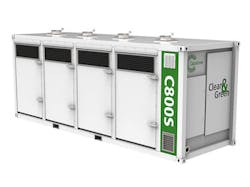Korean Sewage Plant selects Capstone system to convert Methane to Energy for On-site Power
By Rod Walton, EnergyTech Senior Editor
The South Korean distributor for on-site power manufacturer Capstone Green Energy will supply an 800-kW energy system for waste-to-power installation at a sewage treatment facility.
The Noksan Sewage Treatment Plant in Busan, Korea will utilize the Capstone system to convert methane to energy. Distributor CY Tech obtained the order for the Capstone system, which follows an earlier order or a 600-kW energy storage at the Nambu treatment plant in Busan.
Methane makes up about 16 percent of global greenhouse gas emissions and is 30 times more harmful than carbon dioxide in the atmosphere, according to U.S. Environmental Protection Agency figures. Sludge-to-energy system harness the methane instead of letting it escape into the air.
The energy system will ensure power generation resiliency for the treatment plant operations.
"Wastewater treatment plants like the one in Busan have a unique opportunity to take advantage of their methane-rich biogas, which offers a free, renewable fuel source for producing heat and electricity," said Darren Jamison, CEO of Capstone Green Energy. "Not only does it help reduce operational costs, but it also provides an important step forward in the fight against climate change by eliminating waste gas, which could otherwise be a global warming pollutant."
Capstone manufactures and supplies microturbine gen-sets for on-site power operations such as microgrids and combined heat and power facilities.
The Noksan site, which is capable of processing sludge at 160,000 cubic meters per day, will use the biogas produced in the digestion process as fuel to provide on-site power for the 15-building treatment facility as well as the heat required for the digester. The new system will replace an aging digester with a new one in combination with the system installation.
Because the plant is located within the city of Gangseo-gu, Capstone Green Energy systems were selected for their low noise impact and low environmental impact. The system expansion is expected to be commissioned in September of 2022.
